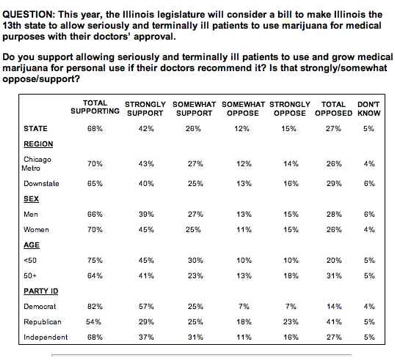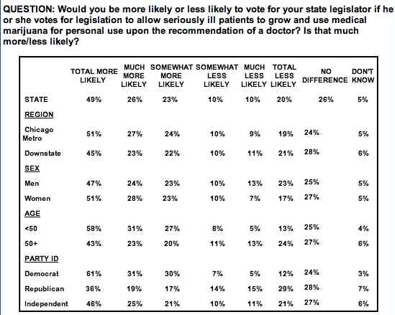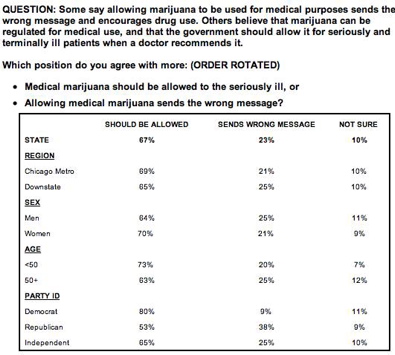* From a Lisa Madigan press release…
My husband, Pat Byrnes, our daughter Rebecca and I are overjoyed to announce the birth of Lucy Lillian Madigan Byrnes.
Lucy was born this morning, March 11, weighing 7 pounds 3 ounces and measuring 20 inches long.
We are thrilled to welcome a second child into our family, and Rebecca is proud to be a big sister.
After working from home for a short time, I will return to the office on a daily basis. While I am home, I will be in daily contact with my staff and, of course, will ensure that the work of the people of Illinois continues without interruption.
Congrats to the Madigan family.
Comments Off  
|
Poll: Broad support for medical marijuana
Tuesday, Mar 11, 2008 - Posted by Rich Miller
* The Marijuana Policy Project has released statewide and regional polling about medical marijuana. Full Illinois results can be found here. Below are some of the charts. The statewide poll was of “625 registered voters interviewed February 9-16, 2008 by Mason-Dixon Polling & Research, Inc. of Washington, D.C. Margin for error is plus or minus 4%.”
Click the charts for larger images…



Not surprising. The public is often ahead of where the politicians believe the people are. But that won’t stop the fearmongering of the antis.
[h/t: Chambers]
58 Comments  
|
Question of the day
Tuesday, Mar 11, 2008 - Posted by Rich Miller
* I read all of your comments on yesterday’s QOTD about why Jim Oberweis lost to Bill Foster. Many of them were quite insightful, others less so.
* For instance, this Oberweis defeat was not a failure on the part of the state GOP. They didn’t recruit Oberweis to run. As always, he recruited himself.
* There were also some weird references to “The Combine’s” efforts on behalf of Oberweis. Huh? I’m half thinking of banning that phrase from comments because it’s so over-used and usually just downright goofy.
* You’ll never convince me that Sen. Chris Lauzen could have defeated Foster. If you can’t beat a goof like Oberweis in a primary, you can’t win a general. Also, I will grant you that Lauzen’s games after the primary hurt Oberweis, but John Laesch also played plenty of games after he lost the Dem primary to Foster. Laesch, by the way, withdrew his petition for a discovery recount yesterday…
In a statement posted to his Web site Monday, Laesch said his decision was based on consultation with his senior campaign staff, and was made in light of Saturday’s election results.
* Other excuses were floated yesterday…
Oberweis spokesman Bill Pascoe said Monday that it is too early to accurately assess how the election slipped away. He said he would need to see numbers telling him who voted, and where.
“One of two things is true,” Pascoe said. “Either we had a problem with our message, or a problem with organization.”
Yes, on both counts, plus you gots a problem with your candidate, Bill.
* More from that article…
(O)ne high-ranking Republican operative went so far as to suggest Oberweis step aside.
“Jim Oberweis needs to either get out of the race or come up with a new strategy and a new direction if he has any hope of running in November,” said the Republican leader, who asked not to be identified.
As I’ve said since election night, we’re gonna hear more about that topic as the days go by. But I doubt Oberweis will drop out.
* And a Daily Herald editorial made a good point that was also mentioned in comments here yesterday. Suburban demographics are changing…
But there’s little doubt, either, that the dramatic change also reflects a growing Democratic presence in the suburbs
* And CQ Politics pointed out how rare it is for a party flip to happen in a special election…
Democrat Bill Foster’s special election victory Saturday… marked the first time in nearly four years in which the challenging party won control of a congressional district from the incumbent party in a special election.
According to a study by CQ Politics, the incumbent party had been victorious in each of the past dozen special U.S. House elections… Over the past two decades, a partisan turnover in a special election has occurred about once every two years.
* Robocalls were also mentioned yesterday, and popped up in one story today…
[Former Kendall GOP Chairman Dallas Ingemunson] also wondered if an aggressive campaign, particularly multiple robo-calls from Oberweis’ campaign in the days before the election, turned voters off.
* And the Wall Street Journal had this observation….
Saturday’s result showed once again that a hard line on illegal immigration doesn’t win elections. The longer Republicans pretend that it does the more elections they will lose.
And that will be our QOTD today….
* Question: is the Wall Street Journal right? Explain.
58 Comments  
|
Sauerberg unveils insurance proposal
Tuesday, Mar 11, 2008 - Posted by Rich Miller
* Sauerberg unveiled a plan to revise the health insurance system…
Republican U.S. Senate candidate Steve Sauerberg says the nation’s health care system must undergo a free-market, capitalist overhaul to better serve the American public. […]
Along with fighting insurance fraud and simplifying the application process, Sauerberg’s health care plan would credit subscribers who buy their own insurance. Sauerberg proposes that taxpayers receive a $2,000 rebate for individuals, or a $5,000 rebate for families, to purchase their own insurance, as opposed to giving employers a tax benefit for providing their employees with insurance.
“Giving families control over the insurance they purchase will also ensure that individuals get the coverage most appropriate for their age, and need,” Sauerberg said.
The article doesn’t explain it, but it looks like Sauerberg wants to take away the employer tax benefit. That may not go over too well in a campaign. It’s not like he’s gonna win anyway, but go ahead and discuss.
23 Comments  
|
[Note from Rich: This is Kevin’s daily post.]
* The U.S. House and Senate have both passed versions of a bill that would increase federal grants for students and crack down on problems in the college loan industry. Making college more affordable sounds great to taxpayers and state officials, until you get to this little caveat:
The House insists that states maintain consistent funding for public colleges and universities. Governors and state legislators have cried foul, saying the feds don’t have the right to dictate such matters.
With a possible recession looming over state budgets, and concern that higher education is out of reach for a growing number of students, the spat highlights the relationship between state funding and public-college affordability.
Congress argues that when state budgets are very tight, higher education is usually not funded fully funded. State policymakers can just place the burden on the institution who in turn can place the burden on tuition payers.
SIUC President Glenn Poshard had this to say in regards to funding at a hearing on the state budget:
“We’re the largest employer south of Springfield and we’re very concerned about this year’s budget,” Poshard said. “Our state funding (at SIUC) has declined about 5 percent over the last six years from $239 million to $227 million. And that’s become a real problem not only for us but for the middle- and low-income families in our district.”
*The provision in the bill would withhold federal dollars if a state failed to provide at least as much as its average spending for higher education over the past five years (not counting expenditures for capital projects and research and development).
The Association of State Colleges and Universities sees the federal maintenance-of-effort rule as “a rather modest proposal to ensure that states contribute to access to higher education,” says Dan Hurley, the group’s director of state relations and policy analysis.
He acknowledges that, as some critics point out, public institutions can do more to rein in costs. But he adds that too much of the blame has been placed on colleges, and more responsibility needs to shift back to state officials who set budgets and tuition rates.
The value of the provision would mainly be symbolic, because the money the federal government could withhold is too small to sway states determined to cut their budgets, Mr. Hurley says. The bill would withhold a state’s share of $35 million for low-income students distributed through federal Grants for Access and Persistence. The secretary of Education could give waivers to states that experience disaster or severe financial constraints.
* Both the National Governor’s Association and the National Conference of State Legislatures are in a frenzy over this. They believe that it is an unfunded mandate on their sovereign states.
Although I think the bill sounds great, I happen to side with the NGA and the NCSL on this one. The federal government really has no business telling the states what to do with their institutions. Discuss.
16 Comments  
|
“If I was lucky, I had a resume”
Tuesday, Mar 11, 2008 - Posted by Rich Miller
* This testimony taints Tony Rezko, but it’s far more damaging to the Blagojevich administration in general…
In her experience, it was who you knew, not what you knew, that reigned supreme in getting appointed to state boards and commissions, a former Blagojevich administration official testified Monday at the trial of Antoin “Tony” Rezko.
Former Director of Illinois Boards and Commissions Jill Hayden spent several hours on the stand Monday detailing the inner workings of who got appointed to state boards in Gov. Rod Blagojevich’s administration and why.
One of the top criteria, she said, was who recommended the candidates and whether they had clout — not what their qualifications were.
“If I was lucky, I had a resume (on the candidate),” said Hayden. “Generally, we’re not looking for the merit of the candidates.”
* And then there was this…
A former Blagojevich staffer, Jennifer Thomas, testified that she met with Rezko at 8 a.m. on Monday morning a number of times in his Chicago office to discuss hiring state employees and filling board vacancies.
She said she was a staffer of the Department of Intergovernmental Affairs at the time and her boss, Joseph Cini, who headed the department, also was on hand for such meetings.
Asked for the names of those who recommended the most people for state positions, she said: “Tony Rezko, (businessman-fundraiser) Chris Kelly, (lobbyist) Al Ronan — that’s what I remember the most.”
Rezko, of course, is the only person charged with overstepping legal boundaries. But the testimony so far is showing just how brazenly political many of the governor’s appointments were.
* Meanwhile, MSNBC has this brief item today…
Obama’s name came up tangentially at the Rezko trial yesterday — regarding nominations to an Illinois health planning board. At a minimum, Obama’s name is being mentioned just enough that the trial is going to provide a blueprint for some reporters to write some negative stories about Obama.
“Tangentially” is right. The item in question is described by the AP…
Earlier Monday, defense attorneys introduced a memo from a Blagojevich adviser, Matthew Pickering, to attorney Susan Lichtenstein, who had served as the governor’s general counsel. The memo said that after legislation was passed restructuring the Health Facilities Planning Board early in Blagojevich’s term, a number of legislators and other officials, including Sen. Barack Obama, were consulted on how to set up the board.
The memo is actually from David Wilhelm’s firm. It describes how his lobbying firm worked with Speaker Madigan, Senate President Jones, House GOP Leader Cross, Sen. Susan Garrrett and Obama to pass a bill that reduced the size of the Illinois Health Facilities Planning Board. The purpose of the memo was to convince Blagojevich to sign the bill.
So, the national media may be using this (and a jury questionnaire that warns them Obama’s name may come up at trial) as a hook to write more Obama-Rezko stories, but this particular item is truly a non-story - unless you think that Sen. Garrett, a noted reformer, is corrupt as well. Balderdash.
* More Rezko stuff…
* Rezko Trial Exhibits
* Blagojevich’s Top Bundlers
* Rezko Donation Chart
* Vetting sheet exhibit
* Rezko rewind. Day 5
16 Comments  
|
Taxes, taxes everywhere
Tuesday, Mar 11, 2008 - Posted by Rich Miller
* This secession idea may make some people feel better, but it’s pie in the sky…
Officials in Palatine will work in the coming weeks to see what can be done to alleviate the major sales tax disparity that will soon plague the suburb.
After news last week that the village wanted to secede from Cook County, elected officials in Palatine said on Monday they want to look at options that could help keep economic development in the town viable. Secession from Cook County is still among the options. […]
One is to form a new county with surrounding towns. To start that, a petition would need to be signed by 51 percent of electors. Then, a county-wide referendum would take place.
Another choice is to merge with an adjoining county, like Lake County. To do that, 51 percent of electors would also need to agree. After that, a referendum of Cook and Lake county residents would be needed for the change.
They can grumble all they want, but are communities like Palatine willing to pay Cook County for any existing roads within their new or merged county? What about forest preserve land? Will they be able to reimburse Cook for treatment given to locals at the public hospital?
It might be a whole lot cheaper to find a way to reimburse some businesses for part of the county sales tax increase, or somehow alleviate the hike. Secession and creation of a new county requires Cook County’s agreement. Switching to Lake County would require the agreement of both Cook and Lake.
It’s not gonna happen. This proposal may help Palatine locals feel better, but it does literally nothing to solve what local officials say is a real problem.
* Meanwhile, in the city…
Chicago home sellers getting lower prices if they can unload their properties at all in the stone cold housing market have a new headache: the 40 percent increase in the real estate transfer tax tied to the CTA bail-out.
The City Council’s Finance Committee voted today to shift the increase from buyer to seller, taking $900 out of the pocket of the seller of a $300,000 home even as home prices continue to plunge.
The current tax — $7.50 per $1,000 of sale price — will continue to be paid by the buyer. The $3 increase per $1,000, which takes effect April 1, will shift to the seller.
Ald. Pat O’Connor (40th), sponsor of the ordinance, said he wanted to evenly divide the entire $10.50 city tax between buyer and seller, “But state law will not allow that to happen.” So, he opted for “the next fairest thing.”
There are no good alternatives here, since the tax hike has already been passed. Either the council can roll back the increase and find the transit subsidy money elsewhere, or they can spread the pain, which is what seems to be happening. That seems to be fair, and might help alleviate a small hurdle to buying a house.
* And speaking of tax hikes…
Cub fans who stand to benefit from new skyboxes, washrooms, concessions — and a new or rebuilt upper deck — at a renovated Wrigley Field could be asked to help pay for it.
Sources say the Tribune Co. is exploring the possibility of imposing a ticket tax — in the range of 25 to 50 cents — to help finance a top-to-bottom overhaul of the 94-year-old shrine of Major League Baseball. […]
“The Tribune will contribute because a restored ballpark would allow the team to make more revenue. But the people coming into the ballpark are another group that benefits. They’re going to a ballpark that’s a nicer place. A ticket tax is one of the sources of funding we may go to.” [said a source.]
If they want to raise prices, that’s fine with me, but in the current environment why would anyone in the Cub organization call a price hike a “tax”?
This is just another example of how Sam Zell’s Tribune is as horrible at PR as his team is at baseball.
9 Comments  
|
Morning Shorts
Tuesday, Mar 11, 2008 - Posted by Kevin Fanning
* Lawmakers try to cut excessive state overtime
In hopes of forcing the governor’s administration to hire more state workers, a new proposal sponsored by State Rep. Lisa Dugan, D-Bradley, would ban state agencies from forcing their employees to work more than a 40-hour work week.
* Residents, legislators voice opinions at budget hearing
* Generation gap in contest to succeed LaHood
* Callahan officially running for Congress
* Our Opinion: Bid to curb pensions comes too late
* Officials want fairgrounds work done by mid-May
* Kayne West’s mother’s death sparks call for plastic surgery laws
One of Davis’ proposals — which could be considered today — would require that board-certified plastic surgeons perform Botox injections and several other procedures, making it illegal for assistants, other medical staff or even medical doctors outside the plastic surgery specialty to do them.
* Seniors, get ready to ride bus for free
* FEMA officials tour Pontiac flood damage
“I’m thrilled, absolutely thrilled,” Mayor Scott McCoy said after the reversal was announced late last week.
* Boone County Dems elect new chairman, vice chairpersons
* DuPage election judges waiting on primary paychecks
Technical problems with a new management system and bureaucratic hoops caused the problem, DuPage County Election Commission officials said.
* CN offers to pay for overpasses in EJ & E bid
* Kirk wants to resurrect mortgage aid program
He wants Congress to restart the Home Owners’ Loan Corp. of the Great Depression to buy and refinance troubled mortgage loans.
4 Comments  
|
|
Comments Off  
|
* Monday, 10:47 pm - Patrick Botterman, who ran more Democratic campaigns than I can count, has passed away. My deepest sympathies to his family and his many, many friends.
* Tuesday, 7:41 am - The Daily Herald has a story up…
Harper College trustee and Wheeling Township Democrat Committeeman Patrick Botterman died of a massive heart attack Monday.
Botterman, 44, a lifelong Arlington Heights resident, leaves behind a long resume of Cook County politicking. He ran campaigns for Melissa Bean, Chicago 32nd Ward Alderman Scott Waguespack, Dan Kotowski’s state Senate run in Park Ridge, and Republican Wheeling Township Supervisor Michael B. Schroeder when he ran for but lost the Arlington Heights village president seat to Arlene Mulder in 1993.
“I think Patrick Botterman is the single most influential political mind in the Northwest suburbs of Chicago,” friend and Democratic strategist Kevin Lampe, 46, of Chicago said.
Botterman was a Harper College trustee from 1998 to 2003 and was recently re-elected to the seat.
* And so does Fritchey…
Pat is the one person in politics who I have ever met who would NEVER back away from a fight, big or small, as long as he believed in it. For that trait, many loathed him. For that trait, I will always respect him.
*** UPDATE *** Rep. Fritchey posted this in comments…
Visitation will be held for Pat as follows:
Friday, March 14
3:00p.m. - 9:00p.m.
Glueckert Funeral Home
1520 North Arlington Heights Road
Arlington Heights, Illinois
* Funeral…
Saturday, March 15, 2008 — 9:30 a.m.
Our Lady of the Wayside Catholic Church
34 West Park Street
Arlington Heights, Illinois 60005
(847) 253-5353
132 Comments  
|
|
 Support CapitolFax.com
Support CapitolFax.com
Visit our advertisers...
  ...............
...............
 ...............
...............
 ...............
...............
 ...............
...............


|
   
|
Hosted by MCS |
SUBSCRIBE to Capitol Fax |
Advertise Here |
Mobile Version |
Contact Rich Miller
|

















